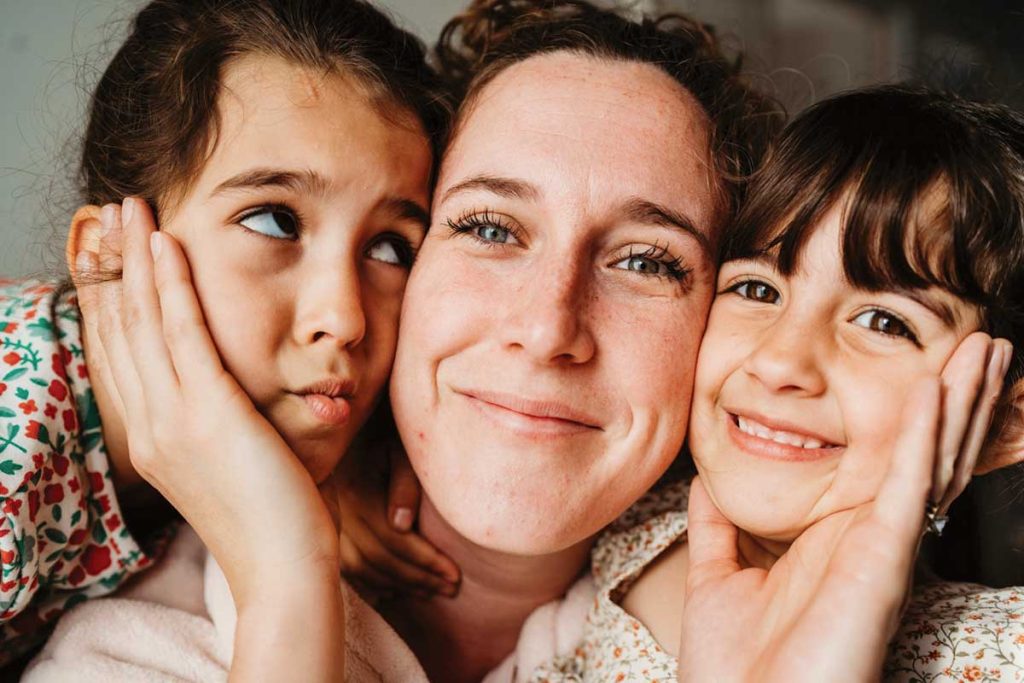
After getting the kids ready for school in the morning, tucking them in at night, and managing the in-between, you may feel that there’s little time to take care of yourself. However, finding time for personal self-care is an important part of parenting.
“Practicing self-care is crucial for parents because it replenishes their energy and supports their mental well-being,” says Becca Reed, a clinical social worker and perinatal mental health therapist in Yarmouth, Maine. “When parents take care of themselves, they help regulate their own nervous system, which is essential for staying calm and responsive.”
Reed further explains that this form of regulation helps parents foster a nurturing environment for their children and supports their ability to co-regulate. Luckily, there are effective self-care strategies you can put into practice regardless of your busy schedule.
Build in peaceful moments
Mindfulness doesn’t need to look like an hour-long yoga class: Reed recommends taking time each day to reflect and relax in bite-sized chunks. “Parents can incorporate self-care into their busy schedules by finding small pockets of time throughout the day. This could be as simple as a five-minute mindfulness practice in the morning, a quick walk during lunch, or listening to their favorite podcast while driving,” says Reed.
Try to stay present during those peaceful moments; concentrate on your breath and observe what’s happening around you—what you see, smell, taste, and hear. Not only do these mini self-care practices center your thoughts, but they also lower blood pressure, decrease your heart rate, and boost immunity.
Ask for help
No one can do it all on their own. Lean on your family, friends, and community for help. There’s no shame in asking another parent if they can share carpool responsibilities or ordering a healthy takeout meal from a local restaurant on extra busy nights.
“For single parents, it’s important to leverage community resources and build a support network. This might include trading babysitting with a friend, seeking out local parenting groups, or using online support communities,” says Reed.
If your children are old enough, enlist their help too. Teach them how to do their laundry, make school lunches, and vacuum up crumbs.
Prioritize your to-do list
When you’re overseeing a household, raising children, meeting work obligations, and squeezing in time for yourself, it’s easy to feel overwhelmed. Practicing self-care includes managing your stress levels, but staring down a mile-long daily to-do list only increases the pressure. It’s important to consider all the tasks you try to squeeze into a single day and set more realistic expectations.
Determine which of your tasks are most urgent and bump them to the top of your list. Complete those first, then move onto less pressing issues. If you don’t get to everything that day, it’s okay to re-adjust. As Reed suggests, “focus on progress, not perfection. Parents can acknowledge their efforts as a parent, even when things don’t go according to plan.”
Practice self-compassion
Studies show that practicing self-compassion leads to stronger interpersonal connections and a decrease in the stress hormone, cortisol. It also lowers your risk of anxiety and burnout and improves emotional regulation, making it an integral part of self-care.
“Parents can cultivate self-compassion by practicing self-kindness, especially during challenging times. This means acknowledging their efforts and being gentle with themselves in place of being self-critical,” says to Reed.
Try reframing your thoughts when you make a mistake or feel distressed. For example, if you feel guilty for getting upset with your child, acknowledge your feelings of frustration. From there, remember that everyone loses their cool from time to time and that you can handle the situation in a more productive way next time. Approaching your faults and suffering from a place of understanding and self-kindness can teach your kids to do the same.
Fill your cup
It’s important to remember that practicing self-care doesn’t have to look the same for everyone. Find practices that fit into your own life and schedule, integrate them, and be proud of yourself for caring for your own needs.
Ever heard the saying, “you can’t pour from an empty cup”? Filling up your own cup first can help make you the parent you want to be.
Parent yourself while parenting your kids
Ways you care for your child Ways to care for yourself Preparing healthy school lunches and snacks with a variety of fruits and vegetables Shopping and experimenting to make meeting your nutritional goals convenient and fun Giving your child their daily vitamins Taking your supplements Teaching your child how to stand up for themselves Establishing boundaries with partners, co-workers, friends, and family members Placing limits on screentime Being conscious of time that you spend on social media Enrolling your kids into sports to keep them active Finding time for active hobbies and exercise that you enjoy Coordinating play dates Grabbing a cup of coffee with a friend Allowing your child to express themselves and be who they are Accepting all your faults and forgiving yourself when you’ve made a mistake Giving your child a hug when they’re upset Taking deep breaths and seeking comfort when you feel frustrated Helping your child with their homework Delegating work and home responsibilities
Add deep breathing to your self-care toolbox
Taking deep breaths can help regulate your nervous system, resulting in clearer thinking, lower blood pressure, and a reduction in cortisol levels. To practice, breathe in for four seconds, hold for four seconds, breathe out for four seconds, hold for four, and repeat.